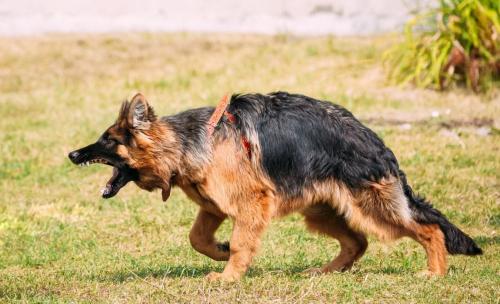Types of Aggression in Dogs

Dogs can display
a variety of aggressive behaviors for different reasons, including fear,
territoriality, dominance, and frustration. Understanding the different types
of aggression in dogs can help you identify the underlying cause and implement
an effective training program to reduce or eliminate the behavior.
· Fear Aggression: Fear-based
aggression is one of the most common forms of aggression in dogs. Dogs may
become aggressive when they feel threatened, either physically or emotionally.
This can occur when they are confronted with a frightening experience, such as
loud noises or unfamiliar people. Fear-based aggression is often accompanied by
growling, snarling, and biting.
· Territorial Aggression: Dogs have a
strong instinct to protect their territory, and they may become aggressive when
they feel that their space is being invaded. This type of aggression is often
directed towards strangers or unfamiliar animals that enter their territory.
Dogs may bark, growl, and even bite in order to protect their space.
· Dominance Aggression: Dominance
aggression is characterized by a dog's attempts to assert dominance over other
dogs or people. This type of aggression can be seen when a dog tries to take
control of a situation, such as guarding a toy or food bowl, or when they are
challenged by another dog or person. Dominance aggression can be expressed
through growling, biting, and lunging.
· Frustration Aggression: Frustration
aggression can occur when a dog is unable to perform an action that they
desire. For example, a dog that is on a leash may become aggressive towards
other dogs when they are unable to approach them. Frustration aggression can
also occur when a dog is prevented from performing an instinctual behavior,
such as chasing a squirrel or hunting prey.
It is important
to seek the help of a professional when dealing with aggressive behavior in
dogs. An experienced dog behaviorist can help you determine the underlying
cause of your dog's aggression and provide a customized training program to
address the issue. Additionally, it is important to ensure that your dog
receives regular exercise, training, and socialization to help prevent
aggressive behaviors from developing.
In conclusion, aggression in dogs can be a serious issue and should be addressed promptly to ensure the safety of both dogs and humans. Understanding the different types of aggression can help you identify the cause and implement an effective training program. With the right training and support, most dogs can overcome their aggressive behaviors and become well-behaved, happy members of their families.
Post Your Ad Here
Comments